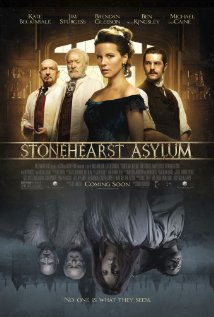
ELIZA GRAVES/ STONEHEARST ASYLUM
US, 2014, 109 minutes, Colour.
Kate Beckinsale, Jim Sturgess, David Thewliss, Brendan Gleeson, Ben Kingsley, Michael Caine, Jason Flemyng, Sophie Kennedy Clark, Sinead Cusack.
Directed by Brad Anderson.
Eliza Graves is based on a short story by Edgar Allan Poe. It is the story of Stonehurst Asylum, a variation on the story of the inmates running the asylum.
It is set at the end of the 19th century, in rather Gothic-looking surroundings, courts, hospitals, mental institutions with their stone and sinister basements. An eerie atmosphere is created which is very important for the film and for the audience response and its moods.
A young woman, Eliza Graves (Kate Beckinsale) is considered by a court to be disturbed and in need of being transferred to an asylum. A young man, played by Jim Sturgess, observes Eliza and decides that he should do something to help her or to save her. As a young doctor, he travels the countryside, which is rather dark and eerie as well, and finds himself at Stonehurst, met by one of the workers, David Thewliss, also more eerie as the film goes on. The head of the asylum, seemingly running an organised institution, but also with eccentricities that are gradually revealed, especially in his self-importance in management and diagnosis, is played with some aplomb by Ben Kingsley.
To go any further into the plot (and what has just been described is only the beginning) would be to reveal too much. Suffice it to say that there are some interesting twists. But, whatever the twists, the film offers a sometimes alarming picture of the Bedlam of such institutions, the role of the staff, the influence of the inmates, the nature of their mental disturbances, the sometimes ruthless repression of symptoms and amateur diagnoses.
The Gothic setting is always arresting, the ordinary part of the institution; most sinister is the basement prison.
The film boasts a very strong cast, with Ben Kingsley making the most of his time as the director of the institution and Michael Caine as his predecessor.
There are quite a number of twists and the plot, confrontations between the sane and the insane, and the final escape plan which leads a romantic couple to very romantic and colourful conclusion.
1. Edgar Allan Poe story? The Gothic style, transposition to England, 1899? Hospitals and mental institutions?
2. Issues of sanity, insanity, the range of treatments, in the 19th century, inhumane, transitions?
3. The opening hospital lecture, Dr Newgate, bringing in Eliza for the demonstration, the cruelty, the hysteria, bending hands, back over, the response of the students, the questions? Wondering about the treatment? The doctor and his easy answers? The wheeling in of the next patient for demonstration?
4. Newgate, the name taken by the young patient, assuming the identity of a doctor, travelling on the cart, arriving at the institution, Finn and the reception, ambiguous, letting him in? Meeting Silas, the letter not arriving? His being accepted? The insistence on the drink? Silas and his attitudes, the young man and his questioning the treatment? Meeting of the patients? Eliza asking if he was truly a doctor – the question that the audience was asking?
5. His hopes, his reaction, meeting Eliza, her personality, playing the piano, the treatment of others? Her warnings? Her role, with Silas? Looking after the young woman, her being a nurse? The later revelations and action?
6. The patients, treatments, no electric shock, the man who thought himself as a horse, his being groomed and fed, the man playing chess with nothing on
the board, music as a positive treatment? The meal and Christmas, the celebrations? The range of other patients?
7. Eliza, her story, the marriage, the brutality of her husband, her biting off his ear, her fear of touch, caution?
8. The young man, hearing the banging, discovering the staff imprisoned? The director and his story? The other members of the staff? Mrs Pike, sympathy? The illnesses, their being left to die? Engineering the escape, going through the snow, the cliff, deaths and their being brought back by Finn, dead? The young man bringing the food?
9. The death of the staff? Silas and his manner, charm, running everything, his control, relying on his abilities? The truth, the flashbacks of Silas’s life, his killing of the soldiers, his treatment? His file and the director indicating where it was hidden, the young man reading it? Mrs Pike’s advising the young men to treat Silas as a patient, empathising? The young men using the photo of a victim, Silas collapsing?
10. The young girl, not wanting to be a nurse, in the care of Eliza? Asking her about falling in love and its meaning? The encounter with Finn, his throttling her? The shock of her death?
11. The celebration party, the different styles of the patients, clothes and masks? The young men spiking the drinks? Finn discovering this, the warning? The fight between the young man and Finn, his being covered by the fall in coal, recovering?
12. The taking of the former director, the electric shock, gagged, his plea to the young man, Silas making the young man administer the shocks? The results? The doctor and Silas finally playing chess, the doctor and his memory loss?
13. The charm of the young man, the mother with the son at war, refusing to eat, his pretending to be the son, his feeding her on behalf of himself? Eliza and her response?
14. The confrontation, the electrodes, the young and putting them on Finn, his burning, the further fire?
15. The young man and Eliza, their escape? The real Dr Newgate and Mr Graves arriving, the couple gone?
16. Happy ending, travelling?
17. The issue of sanity, norms for judging sanity, families putting embarrassing relatives away in institutions? Varieties of treatment, drug treatment, confinement, electric shock? The need for more and more humane treatments, understanding and affirmation?